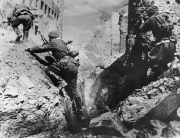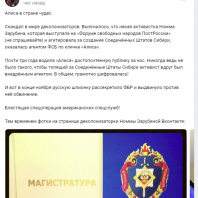
Кому сказать спасибо
 ppetrovichh — 20.10.2022
Колумнист Блумберга Леонид Давидович Бершидский
отметил день 19 октября такой вот интересной публикацией
(в Bloomberg'е, конечно):
ppetrovichh — 20.10.2022
Колумнист Блумберга Леонид Давидович Бершидский
отметил день 19 октября такой вот интересной публикацией
(в Bloomberg'е, конечно):The Wishful Theory of ‘Strategic Russian Defeat’
Advocates of the strategy want to transform Russia the way Germany and Japan were after they lost World War II. But there’s one big hitch.

https://assets.bwbx.io/images/users/iqjWHBFdfxIU/imB8JMddgJ9E/v1/800x-1.jpg
Not the way to win this war.Photographer: Hulton Archive/Archive Photos
ByLeonid Bershidsky
19 октября 2022 г., 07:00 GMT+3
Leonid Bershidsky, formerly Bloomberg Opinion’s Europe columnist, is a member of the Bloomberg News Automation Team. He recently published Russian translations of George Orwell’s “1984” and Franz Kafka’s “The Trial.” @Bershidsky
+ Get alerts forLeonid Bershidsky
Throughout the eight months of the Ukraine invasion, Vladimir Putin has stressed that his war is an existential struggle for Russia, a fight for a new world order. Now, important Western policy thinkers appear to be coming to the same conclusion: The narrative is shifting from helping Ukraine win to shaping a postwar global order that would sideline Russia, rendering it unable to cause further trouble.
This shift challenges the conventional wisdom that the war will end with some kind of negotiated compromise — before or after the Putin regime falls. Many in the West — and not just in Central Europe, where the belief that Russia never changes has always been widespread — will argue that Russia needs to be stripped of its oversized international role. And some will say, increasingly openly, that it must be brought to its knees, like Nazi Germany or its ally Japan, before it can be rebuilt and reintegrated into the world.
French political scientist and civil servant Nicolas Tenzer eloquently laid out this argument on Substack. It was a mistake, he wrote, to try to re-engage with a post-Communist Russia based on an “illusion born of the hopes of 1991” — a mistake made by stupid and corrupt politicians. The West, Tenzer argued, should not be shy about setting its own war goals, even if it’s not officially part of the Ukraine war — and those maximalist goals should include a Russian pullback from every country and region where the Putin regime currently has a presence, including not just Ukraine and Georgia, but also Syria, Belarus, Armenia, the Central Asian states and the African and Latin American nations where the Wagner Group — a private military company linked to Moscow — operates. According to the argument, Russia should also lose its veto in the UN Security Council, all access to the Western financial system and its influence networks in the West. A “semi-defeat,” Tanzer wrote, would still be a victory for Russia because it would retain its global ambitions; Russia needs to be turned into a “normal country” — “the opposite of an empire.” It cannot be transformed from the inside alone.
Fiona Hill, one of the most respected Russia experts in the US and a former Russia guru in the Trump administration, offered a less radical version of the same argument in a recent interview with Politico. She also called for Russia to lose its Security Council veto. The war, she said, isn’t really about Ukraine. “This is a great power conflict, the third great power conflict in the European space in a little over a century,” Hill was quoted as saying. “It’s the end of the existing world order. Our world is not going to be the same as it was before.”
In this paradigm — as in Putin’s — Western interests go well beyond the fall of the his regime. The strategic goal is a Russia permanently diminished. However, even as his troops suffer one battlefield setback after another, Putin is still shaping the discourse simply because Western advocates of his “strategic defeat” can’t articulate how it can actually happen.
What exactly would stripping Russia of its UN veto achieve except a Security Council majority that could authorize the direct involvement of a Western force in the Ukraine war? Putin is not to be stopped by mere condemnation, as numerous General Assembly votes that went overwhelmingly against him have shown. And how does Russia relinquish its military presence throughout the former Soviet Union and in parts of the developing world if it is not decisively defeated in a broader conflict than the Ukraine war? If it is merely forced to retreat from some, or even all, Ukrainian territories, it would still have the size and the resources to maintain influence elsewhere and prepare for another go at Ukraine, too.
Literally no one, even the most radical proponents of stripping Russia of the remnants of its prominent post-World War II role, is suggesting a full-scale war with Russia. Even Tenzer admits as much. “By saying that we are not at war — we are certainly not suggesting that Western leaders declare loudly that we are — we put ourselves in a kind of frame of mind that prevents us from formulating war aims,” he writes. The disclaimer is important: He’s not actually calling on Western governments to declare war on Russia — but he advocates going for results that can only be achieved in a full-scale war.
That taboo against direct military confrontation is a cold-war remnant: It rests on the idea that Russia would respond by nuking the world. Whether or not it actually could, the fear is powerful enough that no responsible political expert wants to cross that line — for now.
What this means is that any prospect for a new world order in which Russia becomes a meek, contrite, post-imperial state now rests on the shoulders of Ukrainians. The hope and expectation is that they will be able to defeat the Russian military without getting nuked in response — or, what goes unsaid is that if they get nuked, their martyrdom will serve the greater goal of turning Russia into a complete pariah and thus permanently weakening it.
For all the Western support that comes in the form of ammunition, training and equipment, Ukrainians are still fighting alone: It’s their soldiers who die, and it’s their country that is being methodically destroyed by Russian strikes on cities and infrastructure. And for all their success on the battlefield, the outcome of the war is far from decided. As Russia goes for the “Syrian option” of trying to bomb Ukraine into the Middle Ages, Ukraine’s advantages in motivation and tactical creativity may not be as effective as they were during the recent counteroffensive. Cynical, poorly armed and trained, Russia’s mobilized soldiers are nevertheless going to make it harder for Kyiv to break through the invaders’ defenses, especially during the winter. And if Ukrainians do win, they have no interest in conquering and “denazifying” Russia: They just want their own country back, and they have a lot of rebuilding to do.
The flaw in the “strategic defeat” logic is that, while Russia’s nuclear capability is seen as the joker in Putin’s hand, there are no practical means for the West to render Russia small and pliant. To achieve the maximum goals, the West would need to ignore Putin’s nuclear leverage and put boots on the ground. Because, again in this perspective, unless Russia is similarly subjugated, it cannot be “denazified” the way Germany and Japan shed their imperialism thanks to decades of occupation, forced demilitarization and externally imposed political structures.
The recourse is to accept that Russia is not out of second chances yet and that it can still change from the inside. It’s naive to expect a liberal democracy to emerge immediately from the ruins of Putin’s regime — a far-right government acting out of an even deeper resentiment is a more realistic scenario. It’s equally naive, however, to expect that a country of Russia’s size and stamina will somehow slink away if the West applies tougher diplomacy or hardens the already unprecedented economic sanctions.
What Russians must be offered is a vision of inclusion, not hopeless, eternal defeat; we need the kind of optimistic prospect Germany and Japan faced as they reformed. Uncompromising toughness that draws the line at direct military interference is as hypocritical a stance as that taken by Putin’s open appeasers in the last two decades. The only future that could unite and motivate the ragtag Russian resistance to Putin, the war, Russian imperialism and totalitarianism — both inside and, increasingly, outside the country — is one in which Russia is part of the West, with all the constraints and benefits that involves.
Russia tried to eliminate the consequences of Stalinism on its own in the 1990s — and it failed. We Russians failed, as I must keep reminding myself. But that doesn’t mean we cannot and should not try again. That is the world’s best hope in the face of total war.
-----------------------------------------------------------------
Ну хорошо, - допустим, что статья действительно враждебная, и если я её воспроизвожу, то меня запросто можно прижать к ногтю.
Однако прошу заметить, господа особо бдительные граждане, что я её намеренно не подвергаю даже машинному переводу. Чтобы не навредить русскоязычному читателю. Возможно, это мне зачтётся.
Но я хотел бы обратить внимание вот на какую проблему.
Если внимательно изучить подрывную деятельность даже не всего этого враждебного ресурса, а просто хотя бы ознакомиться с биографией Л.Д.Бершидского, и сопоставить некоторые её факты с периодами нашей истории, то легко заметить, что Леонид Давидович, хотя и родился в СССР, но воспитывался и становился на крыло как личность уже в условиях России, освобождённой от коммунистического ига. И к коммунистам никакого отношения не имеет вообще.
Основываясь на этом конкретном примере, можно задаться вопросом: отчего же в молодой свободной России выросло поколение, в рядах которого весьма заметно такое негативное явление, как коллаборационизм, т.е. сотрудничество с теми, кого никак нельзя назвать друзьями России и русского народа?
И ведь нельзя сказать, к примеру, что совсем никто у нас не помнит, как Первый Президент освобождённой России чуть ли не взасос был с американскими друзьями-президентами, и была у них даже "дружба семьями" (или домами).
Или как Второй Президент легко и непринуждённо шутковал с улыбчивым американским Президентом, героем Овального кабинета, на тему вступления РФ в НАТО. Или про лодку, которая утонула (но это было уже в другой раз, и не с президентом, а просто с американским журналистом по имени Ларри Кинг).
Кто и какие красные линии между ними тогда проводил, этого я точно не знаю, конечно. Мне никогда ничего не рассказывают, - как говаривал один персонаж у Джона Голсуорси.
Но я верю тому, что говорит наш Президент о действиях бывших друзей: они, эти красные линии, одна за другой настойчиво и целеустремлённо преодолевались нашими белоснежно-зубыми партнёрами. (А я в это время вообще даже рядом пешком не стоял например).
И это было сделано, в частности, при помощи (т.е. при сотрудничестве с партнёрами) таких наших особенно отборных, способных и талантливых людей, примером которых вполне может выступить, в частности, и Леонид Давидович Бершидский, и которые были выращены уже после победы освободителей России в 1991 году.
И выращены они как раз этими самыми освободителями. Именно в РФ, а не за рубежом.
Освободители России делали это специально, в порядке дружбы и сотрудничества, или чтобы компенсировать продвижение партнёров через красные линии?
Но почему же в итоге всех этих дружных и дружественных действий наша страна вдруг оказывается в таком неудобном положении? И как мы дошли до жизни такой, при такой талантливой и яркой элите, выращенной в свободной молодой России? Кому сказать спасибо за всё это достигнутое великолепие?
На мой взгляд, имеется всего два варианта возможного ответа, почему умный, блестящий, талантливый... да просто гениальный человек сотрудничает с недругами своего народа (ну пусть не народа, а хотя бы государства). Но я не стану их "артикулировать", в силу их очевидности.
Хотя что это я поскупился, - их не два, - есть и третий. И это не "вариант Штирлица".
|
|
</> |

 Чек-лист по идеальной уборке в квартире
Чек-лист по идеальной уборке в квартире  Проект дредноута береговой обороны для Китая
Проект дредноута береговой обороны для Китая  Юбилей совместной жизни, или Мы можем всё
Юбилей совместной жизни, или Мы можем всё  50
50  Роман Юнеман: "Скандал в мире деколонизаторов"
Роман Юнеман: "Скандал в мире деколонизаторов"  Про выбор жизненного пути после всесоюзной известности
Про выбор жизненного пути после всесоюзной известности  Хинштейн, как много в этом звуке...
Хинштейн, как много в этом звуке...  Зинаида Серебрякова. Парижский период
Зинаида Серебрякова. Парижский период  Как российские НПФ натягивают своих вкладчиков терпил. За это нужно бить в табло
Как российские НПФ натягивают своих вкладчиков терпил. За это нужно бить в табло 



